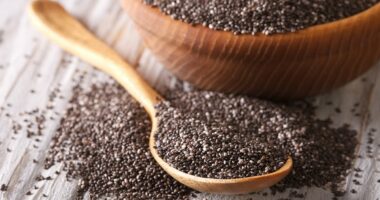Share this @internewscast.com
A common spice found in everything from coffee to soup may reduce the effectiveness of life-saving drugs, a study warns.
Researchers found the main compound in cinnamon interferes with the body’s process of clearing drugs from its system.
The compound, cinnamaldehyde, gives cinnamon its unique taste and smell. It also activates receptors that cause the body to process drugs much more rapidly, possibly reducing the effectiveness of medications.
People who sprinkle cinnamon on their oatmeal in the morning or into a festive beverage should be safe, researchers said.
But people who take cinnamon supplements, which contain higher concentrations of the compound found in cinnamon bark, could be at risk.
Principal scientist Shabana Khan said: ‘Overconsumption… could lead to a rapid clearance of the prescription medicine from the body, and that could result in making the medicine less effective.’
Cinnamon is already known to interact with at least 47 drugs, including blood thinners like aspirin and warfarin — where it raises the risk of bleeding.
But now, scientists suggest the spice could affect a much wider array of drugs, although they said further tests were needed.

Cinnamon has previously been associated with reducing inflammation and boosting heart health, but some cheaper varieties could interfere with life-saving medications
Many people in both the UK and US take cinnamon supplements, which are lauded for their alleged ability to reduce blood pressure and prevent blood sugar spikes.
The spice has also been revered by homeopathic enthusiasts for centuries because of its medicinal properties.
But, Professor Khan warned, very few studies have been able to pinpoint the effects of cinnamon’s primary component, cinnamaldehyde.
She said: ‘Understanding its bio-accessibility, metabolism and interaction with xenobiotic receptors was important to evaluate how excess intake of cinnamon would affect the prescription drugs if taken at the same time.’
Scientists believe cinnamaldehyde – which is found in the oils of the dried plant – is responsible for much of the spice’s health benefits.
Cinnamon is also high in antioxidants, and has also been linked to reducing triglycerides, cholesterol, and blood sugar, according to studies reviewed by Healthline.
Longevity expert Dr Michael Aziz wrote in his book that cinnamon was one of the ‘superstar’ spices in his longevity routine.
He believes it may reduce the risk of someone developing Alzheimer’s disease – pointing to lab studies showing cinnamon could prevent the formation of tau proteins, which form clumps in the brain.
There is little evidence to support this claim, however, and scientists say more research is needed.
It is the spice’s cinnamaldehyde that poses a risk to your daily medication regime as it can activate receptors in the body that break down certain drugs, researchers found.
But the team noted not all cinnamon is created equal.

People who take blood thinning medication should be caution when using cinnamon, experts advise
Cinnamon oil — which typically is used in cooking and hygiene products — poses no risk, but cinnamon bark — which is usually found on spice shelves in grocery stores — does.
The team found cinnamon bark also contains high levels of coumarin, a blood thinner. This could cause problems for people who are already on blood thinning medications, known as anticoagulants.
Conversely, cinnamon oil – which is typically used for its antibacterial properties – poses almost no risk at all.
Whilst more research needs to be done to fully understand the role that cinnamon plays in the body, Professor Kahn urged people who suffer from chronic diseases to proceed with caution.
She said: ‘People who suffer from chronic diseases – like hypertension, diabetes, cancer, arthritis, asthma, obesity, HIV, AIDS or depression – should be cautious when using cinnamon or any other supplements.
‘Our best advice is to talk to a health care provider before using any supplements along with the prescription medicine. By definition, supplements are not meant to treat, cure or mitigate any disease.’

















